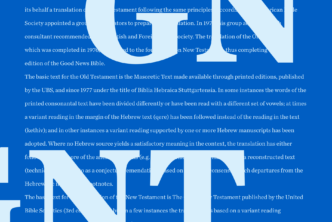“What has Athens to do with Jerusalem?”
When church father Tertullian asked this question, it was rhetorical; the answer, to him, was ‘Nothing.’”
But that’s not exactly true.
To understand the Hellenized Jewish culture Jesus was born into, one should have a cursory familiarity with the poets Homer and Virgil. The Jews, like many of the cultures conquered by Alexander the Great or within Greece’s circle of influence, experienced an assimilation of Greek speech, manners, and culture. Although the more orthodox Jews clashed with their Hellenized brethren over the extent to which Greek culture should infringe on Jewish practices, one can simply look at the translation of Hebrew Scriptures into the Septuagint’s Greek to see how deep that influence went.
Regarding Homer and Virgil’s influence on Hellenized cultures, Karl Olav Sandes writes,
“[Virgil] and Homer, in particular, formed a ‘canon’ of texts that the students met repeatedly and at various levels: ‘Homer’s epics had become the basis for Greek culture. Since classical time they were everybody’s schoolbook (to be more or less retained by memory) and companion for life.’ Homer was the foundational text of the culture in which many NT texts came to life. This conclusion can be inferred from Philo’s extensive discussion on encyclical education, and is supported by Josephus’s writings as well. On the basis of this fundamental role of Homer, it makes sense to look for Homeric traces in the NT, and not to restrict oneself to obvious citations.”—Journal of Biblical Literature vol. 124
The influence of these poets on Hellenized culture goes beyond the literary:
“The impact of the Homeric poems on geographic questions is profound. Geographers normally debated whether Homer accurately relayed geographic information. There is more at stake in these questions, however, than whether Homer is an accurate geographer. Ancient authors of all genres were particularly indebted to Homer as a model and source of material. It is no surprise, then, that ancient geographers engaged the epic poems of Homer.”—Eric C. Stewart, Gathered around Jesus
We might even be surprised by their influence on Scripture. Here Kenneth Boa and William Kruidenier discuss Virgil’s possible influence on a Pauline metaphor:
“It is not uncommon for commentators to suggest what might have been in Paul’s mind when he cried out, ‘What a wretched man I am! Who will rescue me from this body of death?’ (Rom. 7:24). ‘Wretched’ we understand, but what is the ‘body of death’ from which he wants to be rescued? A most gruesome picture is that presented by the Roman poet Virgil (70–19 b.c.), with which his audience in Rome might well have been familiar. In Book Eight of the Æneid, Virgil’s epic poem that chronicles the wanderings of Aeneas after the fall of Troy, the horrific cruelty of the Etruscan king Mezentius is told. To punish and torture his living captives, Mezentius tied them face to face with decomposing corpses of those killed in battle, leaving them bound together until the living captive died. Virgil’s poetic presentation does little to soften the horror of such a fate:
The living and the dead at his command
Were coupled, face to face, and hand to hand,
Till, chok’d with stench, in loath’d embraces tied,
The ling’ring wretches pin’d away and died.
—Virgil’s Æneid, Book EightWhat did Paul call himself—a ‘wretched man’? What did Virgil call those locked in the embrace of death—those ‘ling’ring wretches’? Surely no word other than “rescue” would fit both scenes. And if Paul had Virgil’s epic in mind, then this image of “body of death” suddenly puts the gospel’s deliverance from the law in a new and more serious light.”—Holman New Testament Commentary: Romans
Get works of Homer and Virgil on Community Pricing!
Now you can help set your own price to add these two cultural icons while they’re on Community Pricing.
Homer’s eight-volume Iliad and Odyssey is currently tracking to head into production at $14, and more bids could drive that price down even further. And the four-volume Select Works of Virgil is brand-new to Community Pricing. Bid now on these two important writers!





